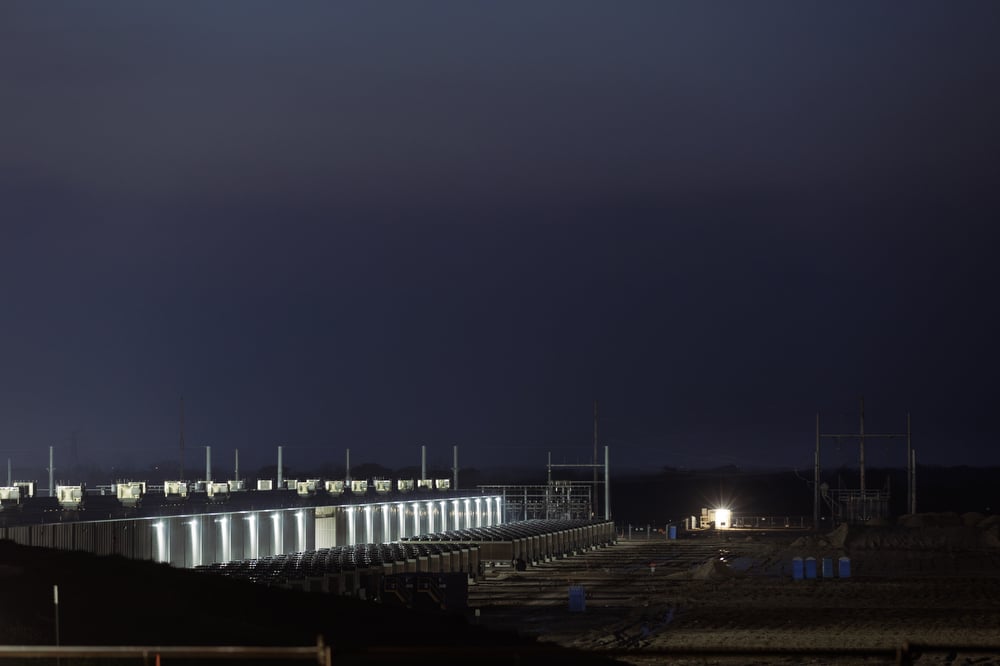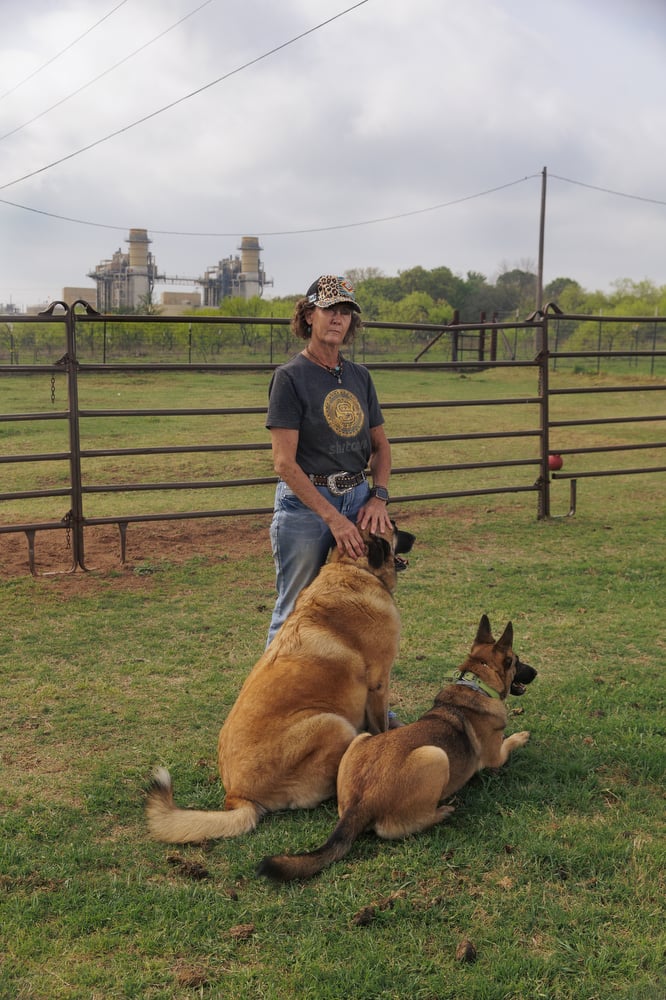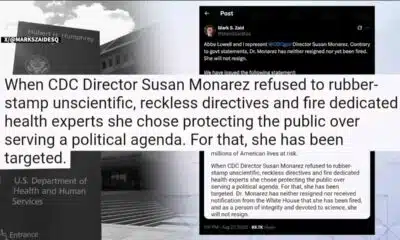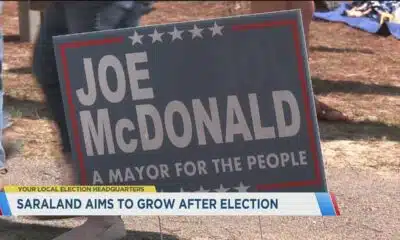News from the South - Texas News Feed
The Crypto Racket
Editor’s Note: This story is copublished with The Nation. Read their version here.
The five members of the Navarro County Commissioners Court had rarely seen such a large audience for their Tuesday meeting as they saw in October 2024, when they weighed a Colorado-based company’s application for a multimillion-dollar tax abatement—an incentive to expand its already-established cryptocurrency mine near the small North Texas town of Corsicana. It was standing room only in the small meeting room of the stately county courthouse. Roughly a dozen locals occupied the first rows of seats, while more than 50 employees of Riot Platforms—the company seeking the crypto handout—filled up the rest, spilling out into the halls.
Commissioners called on Jackie Sawicky to speak. She wore a black t-shirt with a crossed-out Bitcoin symbol below an acronym for the Texas Coalition Against Cryptomining (TCAC), the organization she’d founded in May 2022, days after Corsicana announced that Riot’s 265-acre, 400-megawatt (MW) mine—and 150 jobs with it—was coming to a bucolic area southwest of town where ranches are strung along a two-lane farm-to-market road.
“On April 27, the City of Corsicana announced [Riot was] building the world’s largest Bitcoin mine. The people living off of [FM] 709, these beautiful people, were not informed, nor did they consent,” she told the commissioners. “This is a multibillion-dollar corporation, and they are trying to wriggle out of paying their fiduciary obligation to the county,” adding that a relatively poor county like Navarro could use all the tax revenue it can get.
A little later, Riot Public Policy Director Samuel Lyman painted Sawicky, a 45-year-old permaculturalist who relocated to the 25,600-person Corsicana from the Dallas-Fort Worth suburb of Garland in 2018 seeking more gardening acreage, as a “professional activist,” even though her work with TCAC is entirely unpaid. Lyman said his firm had already donated more than $100,000 to community organizations and that the mine’s proposed expansion, which will more than double its mining output, would generate over a billion dollars in taxable sales to offset the tax break.
Riot workers, many of whom had been bussed in that morning from the mine—which lies in unincorporated territory beside the 400-person hamlet of Oak Valley—wore gray work shirts with reflective yellow safety stripes. Lyman asked them to raise their hands if they supported the abatement. Hands shot up.
Riot Platforms is one of Texas’ biggest Bitcoin players, alongside other cryptocurrency miners including the Nevada-based MARA Holdings Inc., China-based Bitmain, and Houston-based Genesis Digital Assets. Such firms “mine” Bitcoin by using advanced computers to, essentially, make trillions of guesses at unique strings of numbers in order to add to a collective digital ledger known as the blockchain and earn new Bitcoin—something like a craps game where the challenge is to see who can throw the most dice at once. By growing and maintaining this blockchain, miners like Riot earn revenue in the form of Bitcoin, the oldest and most valuable of the so-called cryptocurrencies, that financial invention which has blurred the lines between a currency and a speculative asset while bedeviling government regulators.
While Bitcoin is designed as a decentralized payment system that bypasses banks and credit cards, its consumption of Texans’ true wealth—the state’s natural resources—is centralized in the hands of a few companies, sucking up massive amounts of water and energy to keep hardware running 24/7.
Around May 2021, cryptominers migrated en masse to Texas for its cheap power and deregulated power grid after China outlawed Bitcoin mining. Governor Greg Abbott declared Texas “open for crypto business” and promised to create a new Bitcoin “Mecca.” Since then, cryptomines like Riot’s—consisting of large warehouses or arrays of Conex-style containers filled with stacks of what look like 1980s-era stereo systems laboring day and night at crypto’s contrived random numbers game—have proliferated mostly in remote, unincorporated areas, where they benefit from largely unscrutinized, sweetheart tax deals and sparse regulations.

The October commissioners’ meeting was Riot’s second shot at a tax break in Navarro after the county took no action on the proposal in March 2024. Sawicky had organized residents to oppose the giveaway. Now, facing a surprise agenda item, the few residents able to make the meeting reminded Commissioner David Brewer of a promise he’d made to decline tax gifts for the cryptomine.
Weighing the company’s promise to nearly double its workforce to 290, Brewer and two other commissioners provided the bare majority needed for an unprecedented Bitcoin mining expansion, clearing the way for the world’s first 1-gigawatt cryptomine—expected to consume as much energy as a brand new city with 250,000 homes.
The expansion is set to massively increase Navarro County’s energy footprint in a state where an isolated Texas-centric electrical grid already struggles to meet the demands of its growing population, industry, and recent proliferation of artificial intelligence data centers and other Bitcoin mines. Rising demand means Texas is on track to nearly double its 2023 rate of energy consumption by 2030.
Increasing strain on the Texas grid worries Navarro locals, who have not forgotten the winter storm of 2021, when at least 246 Texans died after a polar vortex blasted all 254 counties. The storm caused blackouts that affected millions from North Texas down to the Rio Grande Valley.
“Texas’ grid is still very fragile. The improvements made so far by the state are inadequate for what’s coming,” Corsicana resident John Blewitt told commissioners. “[The crypto industry isn’t] interested in investing in alternative energy. They want a lot of energy, a lot of electricity, right now, which means burning fossil fuels. The industry creates an enormous carbon footprint. Climate change is real.”
Lee Bratcher, president of the Texas Blockchain Council, a cryptocurrency industry group, told the Texas Observer that approximately 40 mines are operating in the state in 2025, together consuming about 3,200 MWs, enough to power 800,000 homes. But the biggest users are just 15 larger operations that each consume more than 75 MWs of energy.
Texas is the national epicenter of Bitcoin mining, with only about 24 total mines operating outside the state’s borders as of 2023, according to the New York Times. Riot’s first Texas facility, 120 miles south of Corsicana in Rockdale, currently holds the record for world’s largest cryptomine—though only until the firm’s Navarro County expansion is complete.
But Riot’s mines need more than electricity. The firm needs just under 1.5 million gallons of water a day for its unexpanded mine, according to 2022 documents obtained by TCAC and reviewed by the Observer, since the lightning-fast number-crunching will quickly overheat the hardware if it isn’t kept cool. The amount represents roughly an eighth of the City of Corsicana’s current daily maximum water usage.
Riot representatives told commissioners in October they’re drilling two wells to tap water from the Woodbine Aquifer and will store rainwater at the mine’s 18.5-acre retention pond for use, but Corsicana is ceding at least part of its own water supply from local reservoirs, records show, to keep Riot’s computerized “miners” immersed in a thermally conductive liquid.
It’s energy and water that locals like Theresa Hibbitts say they can’t afford to lose in a county that was under a burn ban due to drought conditions at the time of the abatement decision, and in a state whose grid operator regularly warns Texans to conserve energy during winter storms and summer heat.
Hibbitts recalled how the county’s lakes were nearly depleted during droughts in 2006 and 2011, when, she said, “It was cheaper for me to go buy a new set of sheets than to wash [them].” While Navarro County is no longer in drought, Hibbitts and others here know how quickly that can change. “One minute we got a life preserver trying to stay afloat, and the next minute, all the churches have ‘Pray for rain’ on them,” as she put it.
Riot’s tax abatement came after the company made an annexation deal with the hamlet of Oak Valley. In exchange for adding the mine site, the township will gain more than $1.2 million in electricity franchise fees to repave bumpy roads and build a park. Oak Valley residents including Dawn Horn, however, aren’t buying the firm’s PR. She told the Observer she would live with potholes over blackouts.
In recent visits to the existing Oak Valley facility, the Bitcoin operation’s immersion cooling systems so far seem to be staving off significant noise pollution—another issue locals fear.
Other cryptomines that avoid the expenses and resource consumption of liquid immersion cooling typically use industrial fans that create a steady thrum. Many Navarro residents worried Riot’s expansion could bring the same maddening din generated by another cryptomining firm that’s keeping their Hood County neighbors up at night.
MARA Holdings Inc. acquired its 300-megawatt cryptomine in unincorporated Hood County just over 100 miles northwest of Navarro, in January 2024. The mine looks something like the final stage of the classic Space Invaders arcade game come to life, resembling primitive graphics of aliens descending in ships. The facility’s giant trapezoidal cooling fans look like they’ve just landed atop rows of containers housing thousands of mining computers. Instead of fast-paced music, they emit a fluctuating drone.
The mine was first sunk here in 2022, on the same property as Constellation Energy’s fracked gas plant, in the rolling hills near Granbury, a fast-growing suburb outside Fort Worth. The whir of the mine’s fans mixes with the churn of the gas plant, which supplies the mine’s power. The gas plant, which leases roughly 50 of its 255 acres to the mine, received a seven-year tax abatement from Hood County in 2018 that expired this year.
Constellation also hopes to use taxpayer funds to add eight new gas-fired turbines to its plant that would generate 300 MWs—the exact amount of electricity MARA’s mine uses. Citing financial uncertainty related to the project’s permitting process, the company withdrew an application for a taxpayer-funded loan under the Public Utilities Commission (PUC) Texas Energy Fund program in March, but it noted it will likely apply for a different taxpayer-backed loan under the PUC’s Completion Bonus Grant Program.
Cheryl Shadden, a nurse anesthetist and TCAC member, and her eight dogs live across the road. When she moved to this acreage west of the Brazos River 27 years ago, this was an idyllic rural community. Now, she endures relentless racket from the mine and plant combined. While the background noise may not feel immediately jarring, it peaked at about 86 decibels—around the same as a loud vacuum cleaner—on the Sunday in September I visited, as measured by an app on my phone.
In the 1970s, the federal Noise Control Act tasked the U.S. Environmental Protection Agency with setting and enforcing noise standards to protect public health. In 1974, 70 decibels was designated as the maximum limit for 24-hour noise exposure to avoid hearing loss. But, by 1981, Congress had stripped funding for the effort, forcing state and local governments to address excessive noise. In Texas, that authority is largely delegated to municipalities in the form of noise or nuisance ordinances. Unincorporated areas like Shadden’s community in Hood County lack regulatory authority.

During my September visit to the area, I could sense the impact of the mine’s din. While talking with Shadden for about 20 minutes, as she built decorative wooden pumpkins on a workbench, a faint headache began to creep in from my temples, a tiny fraction of the disquiet and distress that she and her community describe living with for two years now.
Shadden says the noise is worse at night. That’s when the mine runs at full capacity, penetrating her walls with noise up to 106 decibels, based on her own app readings, levels that leave her ears ringing. She said she and some neighbors have suffered hearing loss, migraines, and vertigo that they believe is directly related to their prolonged exposure to the low-frequency resonance. (The World Health Organization recommends no more than 30 decibels for sleep quality.) MARA’s sound barrier, which purportedly helps residents on another side of the mine, doesn’t do anything for those elsewhere.
Last summer, Shadden put one of her dogs down after it developed anxiety and began ripping out its fur. Locals believe other animals and wildlife are affected by the unnatural din, though their hunches are hard to prove.
During my visit, we went to see her retired neighbor, Tom Weeks. He says he and his wife are both light sleepers and have spent countless nights awake. He has hypertension and tinnitus, and he suffered a pulmonary embolism and massive blood clot this past summer—conditions he believes have been exacerbated by the noise. A veterinarian has prescribed gabapentin to treat his dog’s anxiety.
In Texas, the state does virtually nothing to regulate cryptomines. Although miners face up to $25,000 in fines each day if they failed to register large mines consuming over 75 MWs by the PUC’s February 1, 2025, deadline, no state agency places strict rules on the mines’ noise levels or resource consumption. Hood County residents can appeal to the Texas Commission on Environmental Quality (TCEQ), but it regulates only the mine’s power source: Constellation Energy’s Wolf Hollow II gas plant. “The people have been left out of this thing since day one,” Weeks told the Observer. “There has been no consideration or concern for human beings at all. It’s just wrong.”
Next, we visited Virginia and Nick Browning, a couple who have lived for over 30 years on property north of the plant and mine. While Nick isn’t bothered by the cyptomine’s noise, given his deteriorating hearing, Virginia is kept awake and suffers bouts of vertigo after sleepless nights. “Some days, I look like I’m drunk. I mean, that’s how I walk. I can’t walk and have my head up,” she said.
Shadden, Weeks, the Brownings, and others recently banded together with the environmental law firm Earthjustice to file suit against MARA. The lawsuit details myriad health problems residents have reported—including a non-cancerous mass doctors found in Virginia Browning’s brain over the summer and can’t explain.
Residents are seeking an injunction to stop the mine’s noise, arguing it constitutes a private nuisance under an obscure 1973 Texas criminal law, which outlines penalties for excessive noise above 85 decibels. They’re also collecting data for potential personal injury lawsuits against both MARA and Constellation, and have successfully pressured leaders in Hood and neighboring Somervell County to pass resolutions opposing the existing mine and proposed gas plant expansion.
In an email to the Observer, Adam Pollock, a spokesperson for MARA, categorically rejected residents’ allegations about noise, writing in a statement that the company’s mine is in an established industrial zone, its sound measurements are below legal limits, and that there’s no link between the company’s operations and the alleged ailments. “MARA is committed to being a good neighbor and has a track record of sustainable business practices and adding jobs and tax revenues to the communities in which it invests,” he wrote.
For now, locals are celebrating a victory related to the gas plant, not the mine: In February, the TCEQ granted residents a contested case hearing process in response to their challenge to the Wolf Hollow II expansion. If the residents prevail, an administrative judge could submit a recommended proposal for TCEQ to deny or modify the permit.
If approved, the plant’s new turbines, known as Wolf Hollow III, will add hundreds of thousands of tons of toxic emissions to the area. Those include climate-warming greenhouse gasses and volatile organic compounds.

In August, Shadden and her neighbors traveled to the Texas Capitol to testify against the Wolf Hollow III application for a taxpayer-funded loan from the PUC. That’s where I met Danny Lakey, who lives on a hill within a mile of the mine and gas plant. He showed me screenshots of a sound-measuring app with a reading of 79.7 decibels.
Shadden told members of the Texas Senate Committee on Business and Commerce that, since the cryptomine began operating in 2022, the gas plant has been running at “99 percent” capacity, sometimes shaking houses when it has to blow off pressurized steam through valves to control compressor surges. While Houston was without power during Hurricane Beryl in July, she said she saw valves blow regularly at the Wolf Hollow as it strained to supply power to MARA’s round-the-clock cryptomine.
Shadden and others also lobbied legislators in support of resurrecting Senate Bill 1751, an ultimately unsuccessful bill introduced by GOP state Senator Lois Kolkhorst in 2023, which would have limited cryptomining incentives, including the “demand response” programs in which large crypto firms can sell energy back to the Electric Reliability Council of Texas, the state’s grid operator, during peak demand times. SB 1751 would have capped those incentives at 10 percent and withheld abatements from miners consuming more than 75 MWs.
The efforts ended in disappointment: The PUC approved Constellation’s Texas Energy Fund application in September—before the company voluntarily withdrew its bid to likely reapply for a different loan. Meanwhile, the Legislature has only moved in crypto’s direction since the Capitol visit.
Texas’ first legislative session following the reelection of President Donald Trump, who vowed to make the United States the “crypto capital” of the world, has put Sawicky, Shadden, and other environmental advocates on the defense.
This session, state Representative Giovanni Capriglione and state Senator Charles Schwertner, both Republicans, introduced separate bills to create a strategic Bitcoin reserve. As of early April, the Senate had passed Senate Bill 21, which would allow the state to build a crypto stockpile, boosting the industry. Trump signed an executive order in March that would create a similar federal reserve.
In 2023, a New York Times analysis found that 34 large U.S. cryptomines combined to pump 16.4 million tons of carbon pollution into the atmosphere per year. The rampant growth of cryptomining in Texas and elsewhere pushed the Massachusetts-based Quiet Communities Inc. to file a 2023 lawsuit against the EPA to revive Noise Control Act regulations rolled back in the 1980s.
In addition to the ongoing Hood County case, Earthjustice Deputy Managing Attorney Mandy DeRoche told the Observer that the organization is litigating other cryptomine cases in New York and Pennsylvania involving communities impacted by noise or indirectly impacted by gas and coal ash plant pollution exacerbated by cryptomining. The firm, she said, is considering petitioning the EPA to implement federal noise statutes specifically for cryptomines.
Many analysts had expected the Bitcoin bubble to burst in 2023—after the infamous 2022 collapse of the FTX crypto exchange, where customers had exchanged cryptocoins for conventional currency or other cryptocurrencies. Depositors withdrew assets shortly before FTX CEO Sam Bankman-Fried’s 2022 arrest on charges of fraud, conspiracy, and money laundering. But prices rebounded even after Bankman-Fried’s 2023 conviction. Miners began expanding while pouring $133 million into the 2024 federal elections, primarily backing Trump and GOP legislators including Senator Ted Cruz, who owns at least three cryptomining machines in the West Texas town of Iraan. In 2023, Cruz disclosed a purchase of between $50,000 and $100,000 in Bitcoin following an endorsement by the Texas Blockchain Council (TBC).
Bitcoin prices have rallied, spurred by Trump’s executive order supporting crypto growth and deregulation. But as cryptomining expands, it is also becoming more cutthroat, requiring ever-increasing computing power, more advanced hardware—and even more energy. A BloombergNEF model predicted that if the 2023 cryptomining peak loads triple, Texans’ peak electricity rates could soar by 30 percent. If the expansion is sixfold, rates could increase by 80 percent. Right now, according to TBC’s Bratcher, the industry is growing by 20 to 30 MWs a month.
“THE PEOPLE HAVE BEEN LEFT OUT OF THIS THING SINCE DAY ONE.”
The growth of Texas’ cryptomining industry massively increases consumption of fossil fuels that cause climate change. And its advocates actively promote a political agenda that includes climate denial. TBC spent more than half of its $949,488 revenue in 2023 on a lobbying firm.
A 2024 Greenpeace report noted that TBC advisory board member Genevieve Collins also directs Americans for Prosperity Texas, funded by the Kochs and the American Petroleum Institute, which is among the most vocal opponents of energy and environmental policies aimed at addressing the climate crisis.
Another TBC board member, Riot Platform’s Head of Public Policy Brian Morgenstern, worked in the first Trump administration as deputy press secretary at the White House, the same report said. He collaborated with former Energy Secretary and Texas Governor Rick Perry to form the America First Policy Institute, which has championed “drill, baby, drill” policies.
In its years as a crypto leader, Riot has already rebranded twice: In 2017, the company changed its name from Bioptix to Riot Blockchain and then to Riot Platforms in 2023, as part of an effort to pitch itself as a data center operator.
Riot, like other cryptominers, thrives partly on public largesse. In addition to tax breaks, roughly a quarter of its total 2023 revenue, $33.7 million, came from energy subsidies for not executing its primary function: mining Bitcoin, as part of its participation in ERCOT’s demand-response program.
Chris Jones, an electrician who worked at the Navarro County Riot facility for over a year troubleshooting the power system supplying the facility’s hardware, alleged in March that Riot is attempting to misclassify its facility near Corsicana as a data center in its application for an exemption from state sales taxes even though he claims it doesn’t meet the legal requirements.
In December 2024 and February 2025, Jones, a 27-year certified electrician, filed multiple complaints to the Securities and Exchange Commission, the Texas Attorney General’s Office, and ERCOT describing alleged irregularities by Riot, including potential misuse of public funds and misrepresentation in the firm’s financial reporting. He also filed a complaint with the federal Occupational Safety and Health Administration (OSHA) about what he described in the complaint as “ungrounded current” running through the facility’s electrical conduits. “That place is a death trap. I’m surprised someone has not got killed up there yet,” Jones told the Observer. “It’s the most dangerous place I ever worked, and I used to work in coal mines.”
Records show OSHA moved to close Jones’ case in February after receiving a response from Riot Platforms Vice President of Safety Frank Durant, who said he’d investigated and corrected the issues Jones described. Jones sent a rebuttal to the agency disputing Durant’s claims on February 23. Jones was fired, he said, on March 3 after sharing his concerns on social media. The agency is now investigating Jones’ termination as potential retaliation, according to OSHA documents and emails Jones shared with the Observer.
In an email to the Observer, a Riot Platforms spokesperson called Jones’ claims “categorically false,” writing: “While it is disappointing that a disgruntled employee feels the need to make these statements, our focus is on our business and continuing to be a positive contributor to the Navarro County community.”
During the Navarro Commissioners Court hearing in October, Riot Senior Vice President of Operations David Schatz told commissioners and residents that the firm has already improved the land it bought in 2022. “We have about 80 acres that’s unused, that we planted 1,000 trees on, that is protected, that we do not touch. … Nobody told us we had to do it—because we’re good stewards of the community,” he said.
Citing two meetings the firm held for the public, Schatz said, “Since Day 1, Riot has been transparent about what we’re doing here, including what we’ve done in the past. This is a rinse [and] repeat of what we’ve done in Rockdale. We have a proven track record.”
Sawicky, however, told the Observer that those public events were only held after TCAC members and others demanded more accountability with a week-of-action protest and petition campaign. She told the Observer she was forbidden from livestreaming the supposedly public meet-and-greet with Riot representatives at the Corsicana Opry last May and was monitored by a security guard. Police escorted her out of a second event at the Opry the following month after she said she pulled out her phone to film.

Trump’s reelection and the county’s abatement decision were the last straw for Sawicky. She disbanded TCAC in November and began packing her things to move to New York state. She plans to put her Navarro County home on the market. “My time and energy and activism is valuable, so I’m going to spend it where it’s going to have the biggest impact and where it’s appreciated,” she said. “I don’t have any hope for this state. It’s terrible. It’s getting worse.”
She and Shadden vow to continue their advocacy against cryptocurrency mining, but as members of the National Coalition Against Cryptomining (NCAC). For now, Sawicky will help NCAC form a board and obtain its 501(c)(3) status. Shadden, meanwhile, is strategizing about how to incorporate her Hood County community as a township. Maybe then she’ll win the right to enact some modest regulations for the Wolf Hollow gas plant and Marathon’s cryptomine.
“We’ve got to do something,” Shadden told the Observer. “I mean, how long are all of these communities throughout Texas going to tolerate this?”
This story was supported by a grant from the Fund for Investigative Journalism.
The post The Crypto Racket appeared first on www.texasobserver.org
Note: The following A.I. based commentary is not part of the original article, reproduced above, but is offered in the hopes that it will promote greater media literacy and critical thinking, by making any potential bias more visible to the reader –Staff Editor.
Political Bias Rating: Center-Left
This article presents a clear ideological stance against the growing influence and environmental impacts of cryptocurrency mining in Texas, particularly focusing on the tax incentives and regulatory leniency granted to mining companies. The tone and language express concern about the strain on local resources, such as energy and water, and the long-term environmental and societal consequences. While it highlights the opposition from local activists and residents, the article is sympathetic toward their concerns. It also critiques the political and economic forces backing the mining industry, including GOP politicians and their policies, thereby presenting a left-leaning perspective on environmental and corporate accountability issues.
News from the South - Texas News Feed
Bevo will not travel to Ohio for the Longhorns’ showdown against the Buckeyes. Here’s why
SUMMARY: The Texas Longhorns begin their season Saturday against Ohio State in Columbus, but their live mascot, Bevo—a 2,100-pound steer—won’t attend. Handler Ricky Brennes explained that traveling to Ohio early in the school year would disrupt students in the Silver Spurs Alumni Association, who manage Bevo, and the long trip isn’t ideal for the steer. The 18-hour drive requires multiple stops for Bevo to stretch and rest in pastures overnight, as he doesn’t stay in the trailer overnight. Bevo is expected to appear at the Longhorns’ next three home games starting September 6.
Read the full article
The post Bevo will not travel to Ohio for the Longhorns' showdown against the Buckeyes. Here's why appeared first on www.kxan.com
News from the South - Texas News Feed
DHS waives environmental laws to build more border wall through wildlife tracts in South Texas
SUMMARY: The Department of Homeland Security, led by Secretary Kristi Noem, is waiving numerous environmental and health regulations to expedite construction of five miles of border wall through wildlife refuges in South Texas’s Rio Grande Valley. These waivers affect protected areas within the Lower Rio Grande Valley National Wildlife Refuge, threatening endangered species and habitats. Environmentalists criticize the move, highlighting the violation of 31 laws, including the Endangered Species Act and Clean Water Act. Despite historically low border apprehensions, DHS insists the construction is vital for security. Critics argue the wall disrupts wildlife corridors and targets federal lands to avoid legal hurdles, causing significant ecological harm.
Read the full article
The post DHS waives environmental laws to build more border wall through wildlife tracts in South Texas appeared first on www.kxan.com
News from the South - Texas News Feed
About 750 new laws will go into effect in Texas on Sept. 1
“More than 800 new laws will go into effect in Texas on Sept. 1. Here are some of the significant ones.” was first published by The Texas Tribune, a nonprofit, nonpartisan media organization that informs Texans — and engages with them — about public policy, politics, government and statewide issues.
Sign up for The Brief, The Texas Tribune’s daily newsletter that keeps readers up to speed on the most essential Texas news.
More than 800 new laws are about to take effect in Texas, and they are set to bring sweeping changes to the state’s education systems, water infrastructure and more.
Gov. Greg Abbott signed 1,155 bills that came out of the regular legislative session, including over 200 laws that went into effect immediately such as the school cellphone ban, the abortion ban clarification, property tax cut and increased oversight over the energy grid. Meanwhile, some won’t activate until next year or until voters approve constitutional amendments in November, such as stricter bail policies and a $3 billion dementia research fund. In addition, there are 140 bills that the governor didn’t take action on, including 34 that took effect immediately.
Most, however, will start on Sept. 1, the traditional date for laws passed during the regular session. Here are some notable measures that will soon take effect:
Senate Bill 1 lays out the state’s new $338 billion two-year spending plan, with over 70% of the budget being reserved for education and health and human services. Some notable parts include spending to maintain and provide property tax cuts, a new school voucher program, additional funding for public schools, as well as investments in the state’s energy, water and broadband infrastructure.
The plan also initially included a $60 million measure that would have let Texas enter a federal summer lunch program for low-income kids, but Abbott vetoed it due to “significant uncertainty regarding federal matching rates for this and other similar programs.”
Senate Bill 2 will create one of the country’s largest school voucher programs, allowing parents to pay for their children’s accredited private school tuition or other education-related expenses with public tax dollars. In most cases, each child will receive just over $10,000 per year, though students with disabilities could receive up to $30,000 in additional funding. Wealthier families with children already in private schools could also participate.
Texas can spend up to $1 billion during its upcoming two-year budget cycle, though the program’s cost could rise significantly afterwards.
The law’s passage followed years of fighting between GOP lawmakers, who framed the issue as providing school choice to parents, and Democrats and rural Republicans who said vouchers would harm public schools. Abbott threw his weight behind the effort to elect more pro-voucher Republicans and succeeded last year. SB 2 takes effect on Sept. 1, but the voucher program itself isn’t expected to launch until the 2026-27 school year.
House Bill 2 will provide about $8.5 billion in new money to public schools, as districts across the state tackle long-running challenges following years of stagnant funding. From this pot, more than $4 billion will go toward raising educator’s pay. The additional dollars will also be used for educator preparation, special education, safety requirements and early childhood learning. A significant part of the law activated immediately, while another big chunk will take effect on Sept. 1. Some will roll out in future years.
Senate Bill 10 will require the visible display of the Ten Commandments on donated posters that are at least 16 by 20 inches in public school classrooms, which are attended by around 5.5 million students in Texas. While supporters said Christian teachings are important to understanding American history, critics said this law undermines the separation of church and state. Such laws have already faced legal challenges in Texas and other states. They include an Aug. 20 ruling from U.S. District Judge Fred Biery, which temporarily blocks the measure from taking effect for nearly a dozen school districts including Austin, Houston and Plano.
“This issue is likely to get to the United States Supreme Court,” Biery said prior to the case’s opening statements in San Antonio. Texas is expected to appeal his ruling.
Senate Bill 12 will extend the ban on diversity, equity and inclusion policies to K-12 schools. In particular, it will prohibit school districts from factoring race, ethnicity, gender identity or sexual orientation into hiring decisions. It will also bar schools from offering instructions, programs and guidance that focus on sexual orientation or gender identity, including sponsoring student clubs such as Gender and Sexuality Alliance. The law’s backers said the legislation gives parents more control over their children’s education, while critics said it targets and censors marginalized groups, such as LGBTQ students. Some civil rights groups including the ACLU of Texas have vowed to fight the law in court.
Senate Bill 13 will give parents and school boards more power over what students can access in public school libraries. These boards can also delegate this oversight process if 50 parents in the same district sign a petition for the creation of a local school advisory council. Supporters said the law will protect students from inappropriate content and give parents more control over what their children consume, while critics said it will lead to increased censorship of certain topics such as gender and race. Texas was already among the top states for book bans in recent years, according to PEN America.
Senate Bill 37 will give politically appointed regents more power over public universities, including by granting them more say over the hiring of administrators, as well as over some responsibilities that were traditionally held by faculty members. It will also create an office that can investigate universities for failures to comply with state laws, such as regarding DEI initiatives. The law’s backers said it is needed to tackle what they consider to be liberal bias in universities and better align them with Texas’ workforce demands. Critics, however, said the law will threaten academic freedom and undermine research.
House Bill 33, authored by Republican state Rep. Don McLaughlin who was mayor during the Uvalde school shooting, will require law enforcement agencies across Texas to establish crisis response policies. Among several changes, the law will compel school districts and local law enforcement to meet annually in order to assess their emergency operations plans, resources and capabilities. It will mandate law enforcement agencies and emergency medical service providers to complete training programs on how to respond to active shooters at primary and secondary schools. And following an actual shooting, these responders will also have to file a report detailing and evaluating their actions within several months to facilitate faster public access to information.
Senate Bill 7 will create a framework for funding water projects through the Texas Water Development Board and providing oversight over them, amid a broad effort to tackle the state’s looming water crisis. Certain sections of the law would take effect in September 2027, if voters approve the constitutional amendment outlined by House Joint Resolution 7 in November. This ballot measure, if accepted, would allocate $1 billion each year from the state’s sales and use tax revenue to the Texas Water Fund between 2027 and 2047.
Senate Bill 15, which received mixed support from both parties, will allow for certain single-family homes to be built on smaller lots. In particular, the law will ban big cities from requiring these homes to sit on more than 3,000 square feet of land, if they are being constructed in a new subdivision that is at least five acres in size. This is a drop from the 5,000 to 7,500 square feet of land that are commonly required in Texas’ largest cities — except for Houston — according to a Texas Tribune analysis. While some lawmakers were wary about interfering in local control over the issue, supporters said the change will allow cities to build more housing and keep costs down.
Senate Bill 17 will ban governments, companies and individuals who legally reside in China, North Korea, Russia and Iran from owning land and properties in Texas. The governor also has the authority to add countries or entities to the list. The prohibition doesn’t apply to U.S. citizens or permanent residents. The law’s backers said this is about protecting resources and national security from hostile nations, while critics said SB 17 is discriminatory and will lead to racial profiling.
Senate Bill 33 will ban cities or counties from using their money to support residents seeking abortions outside Texas. The law followed Austin City Council’s appropriation of $400,000 last year to help such individuals, prompting lawsuits from Attorney General Ken Paxton and a former council member. San Antonio City Council also allocated $500,000 for a reproductive justice fund in 2023, though it ended up not being used for abortion-related initiatives following a private lawsuit and much debate. It then approved $100,000 in April for abortion-related travel, which was temporarily blocked after Paxton sued.
House Bill 46 will expand the state’s medical marijuana program to include patients with chronic pain, traumatic brain injury and Crohn’s disease. Physicians will also be able to prescribe inhalation via vaporized and aerosol products, such as vapes. This expansion will take effect while the Texas Legislature contemplates whether to regulate or ban hemp-derived THC products.
House Bill 229 will define man and woman based on biological reproductive systems and apply that definition across the state code. Government entities collecting vital statistics information will also have to use it. The law’s backers said this is needed to protect women’s rights and align with executive orders declaring that there are only two sexes. Critics said the law erases trans people from state records in Texas, home to one of the country’s largest trans communities.
Senate Bill 835, titled “Trey’s Law,” will ban and void the use of nondisclosure agreements in sexual assault and human trafficking cases. The law’s name honors Trey Carlock, who signed an NDA after being abused as a child by a camp counselor. He died by suicide in 2019. His sister, Elizabeth Carlock Phillips, testified in support of the legislation.
Disclosure: ACLU Texas has been a financial supporter of The Texas Tribune, a nonprofit, nonpartisan news organization that is funded in part by donations from members, foundations and corporate sponsors. Financial supporters play no role in the Tribune’s journalism. Find a complete list of them here.
More all-star speakers confirmed for The Texas Tribune Festival, Nov. 13–15! This year’s lineup just got even more exciting with the addition of State Rep. Caroline Fairly, R-Amarillo; former United States Attorney General Eric Holder; Abby Phillip, anchor of “CNN NewsNight”; Aaron Reitz, 2026 Republican candidate for Texas Attorney General; and State Rep. James Talarico, D-Austin. Get your tickets today!
TribFest 2025 is presented by JPMorganChase.
The story has been updated to correct the number of bills from the regular legislative session that will go into effect on Sept. 1. There are more than 800 bills, not 750.
This article originally appeared in The Texas Tribune at https://www.texastribune.org/2025/08/28/texas-new-laws-sept-1/.
The Texas Tribune is a member-supported, nonpartisan newsroom informing and engaging Texans on state politics and policy. Learn more at texastribune.org.
The post About 750 new laws will go into effect in Texas on Sept. 1 appeared first on feeds.texastribune.org
Note: The following A.I. based commentary is not part of the original article, reproduced above, but is offered in the hopes that it will promote greater media literacy and critical thinking, by making any potential bias more visible to the reader –Staff Editor.
Political Bias Rating: Center-Right
The content presents a detailed overview of recent Texas legislation, highlighting laws typically supported by conservative and Republican lawmakers, such as school voucher programs, restrictions on diversity and inclusion policies, and measures emphasizing parental control in education. While it also notes some bipartisan support and includes perspectives from critics, the overall framing aligns more closely with center-right viewpoints, reflecting Texas’ current political climate and Republican governance.
-
News from the South - Texas News Feed5 days ago
DEA agents uncover 'torture chamber,' buried drugs and bones at Kentucky home
-
News from the South - Texas News Feed3 days ago
Racism Wrapped in Rural Warmth
-
News from the South - Missouri News Feed7 days ago
Missouri settles lawsuit over prison isolation policies for people with HIV
-
Local News7 days ago
Florida must stop expanding ‘Alligator Alcatraz’ immigration center, judge says
-
The Center Square7 days ago
Georgia ICE arrests up 367 percent from 2021, making for ‘safer streets, open jobs | Georgia
-
News from the South - Kentucky News Feed7 days ago
Quintissa Peake, ‘sickle cell warrior’ and champion for blood donation, dies at 44
-
Our Mississippi Home6 days ago
The Dixon: Writing a New Story for Main Street in Natchez
-
News from the South - Oklahoma News Feed7 days ago
Tom Cole’s Powerful Spot on the Appropriations Committee Is Motivating Him to Stay in Congress










































